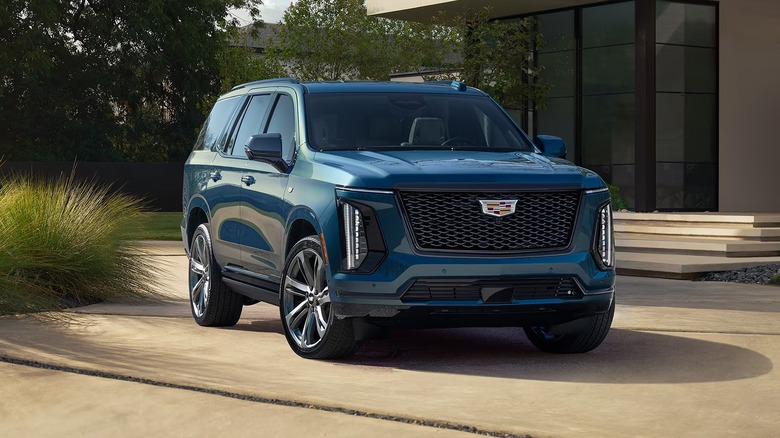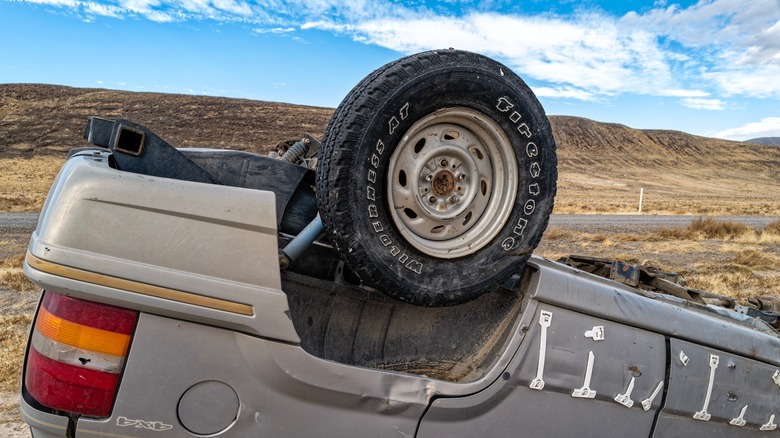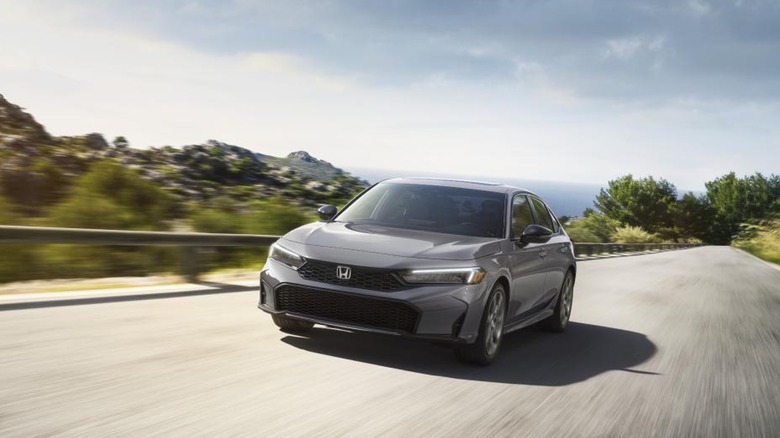Are SUVs Safer Than Sedans? Here's What You Need To Know
According to the Insurance Institute for Highway Safety (IIHS), with all other factors being equal, a larger and weightier automobile offers a greater buffer of safety than a compact, lighter vehicle. You see, the greater the amount of space between the grille and the front seats, the better, as it offers more material for absorbing frontal impacts. Additionally, full-size SUVs that frequently tip the scales between 5,300 and 6,000 pounds, don't come to an immediate halt during an impact, but are carried forward by momentum, reducing the amount of force on occupants inside.
The differences between SUVs and sedans in terms of safety goes even further, if you consider visibility and each vehicle's capability. For example, due to the increased ride height, generally an SUV driver gets a more advantageous point of view. In contrast, as sedans sit lower to the ground, some aspects of the surrounding area may be obscured. While some sedans offer all-wheel drive, it's more common in SUVs, which can offer extra traction when traversing difficult road conditions.
Fortunately, several advancements in automotive safety like surround view camera technology, driver assistance systems, and more comprehensive air bag coverage have made SUVs and sedans safer. Many advanced features like lane departure detection and collision avoidance utilize a combination of cameras, and sensors to monitor when a driver is drifting out of the lane, or doesn't react in time. If necessary, these technologies will act to center the vehicle in the lane or apply emergency braking. With that said, there is more to consider on whether SUVs or sedans are safer.
Some SUVs pose a higher risk of rollover accidents
While many sport utility vehicles may be much greater in size and weight than some sedans, it could come at a cost. Any vehicle could potentially experience a rollover accident given the right circumstances; however, SUVs typically have a higher center of gravity, due to their increased height and enhanced ground clearance.
An important advancement for greater SUV safety was electronic stability, pioneered by one of the cars that revolutionized automotive safety forever. But, while studies by Farmer and Dang in the 2000s (via the National Library of Medicine) have shown that modern systems like electronic stability control have reduced lone SUV rollover fatalities by up to 88%, they are still more prone to tip than sedans.
For example, the National Highway Traffic Safety Administration (NHTSA) crash test data shows that a 2025 Cadillac Escalade is subject to a 21.20% rollover risk. Contrast that figure, with the 2025 Honda Civic Sedan, which sits at only a 9.50% risk of rollover, less than half that of the large Escalade. And unfortunately, rollover risk is only one of the issues uncovered in these 8 new SUVs that have the worst safety ratings.
Sedans are safer than ever before and can better avoid collisions
One of the many improvements made to SUVs over the years, involves making them less dangerous to sedans during a crash. Automakers have taken steps to build lighter SUVs, offering a wide-range of sizes such as compact, mid-size, full-size, and extended-length models. Crossovers have also become hugely popular as something in-between a sedan and SUV and are lower to the ground. These factors help crumple zones of modern SUVs and sedans better match-up during impact, improving the absorption of force.
One advantage sedans have over larger vehicles is their ability to better maneuver in dangerous situations. According to Consumer Report's Senior Director of Auto Testing, Jake Fisher (via Consumer Reports), "Pickups and other large vehicles routinely do worse in our emergency handling and braking tests." The extra weight, larger frame and higher center of gravity don't allow SUVs the same level of responsiveness that many sedan owners enjoy. This added agility could prove to be the difference between a close-call and a roadside crash. Additional technology like Acura's Super Handling AWD can offer even more nimble control, making a sedan's wheels feel glued to the pavement.


